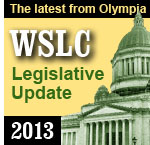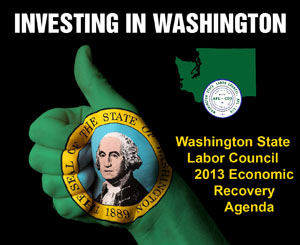STATE GOVERNMENT
GOP+2 = Open season on injured workers
 Following is today’s edition of the Washington State Labor Council’s weekly Legislative Update newsletter, which is also posted here at the WSLC website (in PDF format).
Following is today’s edition of the Washington State Labor Council’s weekly Legislative Update newsletter, which is also posted here at the WSLC website (in PDF format).
Senate coalition wastes no time pursuing partisan, anti-worker agenda
Much has been written about Sens. Rodney Tom and Tim Sheldon, the erstwhile Democrats who decided the public (and their personal résumés) would be better served by having Republicans control the Senate. The new GOP+2 majority began the 2013 session wrapping itself in rhetoric about bipartisanship and cooperation, but most agree they will be judged by their actions, not their words.
 “Whether it’s ‘bipartisan’ or not depends on how we go forward from here,” said Sen. Jim Hargrove (D-Hoquiam) as the 25-of-49-votes takeover was formalized on the Senate’s opening day. “The proof will be in the pudding.”
“Whether it’s ‘bipartisan’ or not depends on how we go forward from here,” said Sen. Jim Hargrove (D-Hoquiam) as the 25-of-49-votes takeover was formalized on the Senate’s opening day. “The proof will be in the pudding.”
Well, one week in, the pudding has been served. And it looks pretty rancid.
On Wednesday, the following bills will be heard in the Senate Commerce and Labor Committee chaired by Sen. Janéa Holmquist Newbry (R-Moses Lake):
SB 5112 gives employers in the Retrospective Rating program more authority over workers’ compensation claims, such as choosing injured workers’ doctors and scheduling their medical exams and vocational rehabilitation.
SB 5124 changes the way injured workers’ benefits are calculated by, among other things removing the value of health benefits, and capping them at the state’s average wage. Bottom line: it cuts workers’ compensation benefits.
SB 5126 circumvents a Supreme Court ruling and allows the state to take legal damages, both economic (lost wages) and non-economic (pain and suffering), that are awarded to an injured worker when a third party is responsible for the injury. Current law only allows economic damages to be “recovered,” which makes sense because workers’ compensation claims and benefits don’t consider non-economic factors.
SB 5127 removes the age restriction on “compromise-and-release” lump-sum buyouts of injured workers’ claims. These buyouts, currently only allowed for injured workers 55 and older, would be expanded to cover all workers.
SB 5128 would make it easier for employers to have these lump-sum buyouts approved by the state.
What these bills all have in common is that they save businesses money by cutting the benefits workers receive when they are injured on the job. That, and they are all sponsored and co-sponsored exclusively by members of the GOP+2 coalition holding a 25-24 majority in the Senate.
Major changes to the workers’ compensation system, many of which were supported by both business and labor, were just approved in 2011. They are not yet fully implemented but are already beating expectations on cost savings, with the state now projecting to save $1.5 billion over four years, $300 million higher than originally estimated. Injured workers are returning to work faster and as a result, employers’ premiums have not gone up for two straight years. Plus, the state will be able to put an estimated $82 million into reserves to start rebuilding the State Fund.
Yet rather than allow these 2011 changes to be fully implemented, the very week that the GOP+2 coalition takes control, it rolls out a wish-list of controversial new benefit cuts long sought by business lobbying groups. These proposals are opposed by labor because they do nothing to improve workplace safety, they just weaken this critical safety net for injured workers.
And that’s just the workers’ compensation bills. On Friday, that same committee will hold hearings on, among other things, repealing the Family and Medical Leave Insurance Act.
Indeed, when it comes to “bipartisanship and cooperation,” actions speak louder than words.
 An opportunity for true bipartisanship
An opportunity for true bipartisanship
What does true bipartisanship look like in Olympia? How about when corporate and labor interests join together with legislative leaders of both parties to support important legislation to create jobs and improve our state’s infrastructure and business climate? It happened last year with the truly bipartisan $1 billion Jobs Bonds legislation, which passed the Senate 44-2 and the House 80-18.
This year, the Legislature has the opportunity to replicate that success. As The Olympian reported on Sunday:
A wide array of Washington interest groups – from labor to business to environmentalists – appears committed to finding agreement on a plan to funnel billions of new dollars into roads, transit, ferries and even storm water projects…
The groups – which include the Washington State Labor Council, Associated General Contractors, the Association of Washington Business, the Washington Roundtable, and top environmental and public-transportation groups – have been talking since last fall.
These talks are in their early stages, but there are already positive signs that legislators and organizations across the political and ideological spectrums recognize that our state’s roads, bridges and transit systems are badly deteriorated and something must be done. The state’s reliance on gas taxes, which have dwindled both due to recession and fuel-efficient vehicles, has created a backlog of projects needed to maintain and improve our transportation system and freight mobility.
This is a top priority for the Washington State Labor Council in the 2013 legislative session and we’ll keep you posted on its progress as the session continues.
Mark your calendars for March 7
The Washington State Labor Council’s 2013 Legislative Conference will be Thursday, March 7 at the Olympia Red Lion Hotel. It will feature legislative leaders and labor lobbyists giving updates on the status of working family legislation. As always, the WSLC Legislative Reception will be the preceding Wednesday evening, March 6 at the hotel.
Look for details soon on how to pre-register for the conference. In the meantime, if you have any questions, contact Karen White at the WSLC Olympia office at 360-943-0608.





